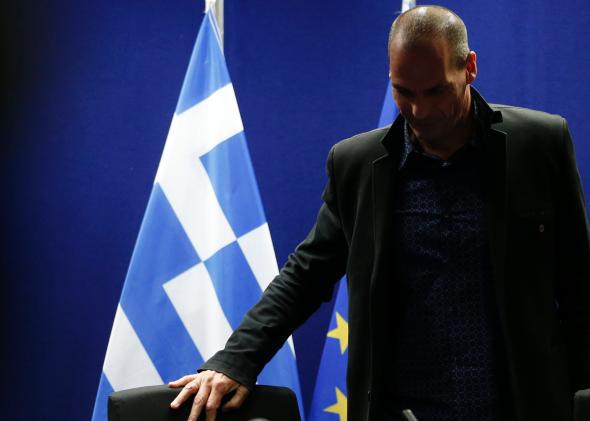The talks over Greece’s bailout took yet another confusing and somewhat worrisome turn this morning, after German officials rejected what looked like a promising deal in the making.
Yesterday, officials in Athens sent a letter requesting a six-month extension of their current rescue loan agreement that was widely viewed as a major concession to its European creditors. Syriza, the far-left party that leads Greece’s governing coalition, had campaigned on ending the country’s old bailout plan, with its severe restrictions on public spending and other austerity measures. But, with time running short to reach a new accord, Greece appeared to be giving ground. After receiving the letter, the eurozone’s finance ministers agreed to meet on Friday to discuss the compromise.
Today, however, Germany’s Finance Ministry rejected Greece’s letter, which amounted to pre-emptively kicking over the negotiating table. “The letter from Athens is not a substantive proposal for a solution,” spokesman Martin Jäger said in a statement. “In truth, it aims at bridge financing without fulfilling the demands of the programme. The text does not meet the conditions agreed on Monday in the eurogroup.”
So what, exactly, is going on here? Greece wants to end, or significantly revise, the terms of its bailout. But without a new infusion of cash from Europe, it will likely run out of money sometime next month. Therefore, it had requested a new “bridge loan,” with fewer conditions attached than the current deal, to keep the government solvent until a long-term solution could be reached. Germany, and the rest of the euro group, wasn’t really having it. They’ve insisted that Greece simply extend the old rescue deal while discussing a permanent solution. Greece’s letter seemed to be a move in that direction. However, as Reuters reports, it left major issues ambiguous, which may have triggered Germany’s response:
[T]he document stopped short of accepting that Greece should achieve this year a surplus on the primary budget - which excludes repayments on Greece’s huge debts - equal to three percent of the country’s annual economic output, as promised under the bailout deal.
Tsipras wants to cut that to 1.5 percent to allow more state spending to ease the plight of the Greek people, while the document left the issue open by speaking of attaining “appropriate primary budget surpluses”.
In other words, Greece wants wiggle room on just how austere its austerity budget has to be. And Germany isn’t tolerating it. And as goes Germany, so goes the European Union (mostly).
So, where does that leave things? Even if Greece and Europe can’t reach a deal during tomorrow’s meeting, that still leaves some time to strike a final bargain. The euro group originally set a Friday deadline for talks so that national parliaments in Europe would have ample time to approve any loan extensions—but, if worst comes to worst, they can also green-light a deal in a hurry.
The bigger problem may be Greece’s banks. At the moment, frightened depositors are pulling money out of Greek financial institutions, and while it hasn’t snowballed into a full-on run yet, it could turn into one. If that happens, Greece may have to consider capital controls, which limit how much cash account holders can withdraw or send abroad. But there’s even more pressure. Right now, Greece’s banks are basically surviving on emergency lending from the European Central Bank, which could possibly decide to turn off the tap if, say, it doesn’t think a bailout deal is in the cards. That would likely plunge the financial system into an instant crisis, and could force Greece out of the euro, which is why the Financial Times is calling it the “nuclear option.” Hopefully it doesn’t come to that. But if Germany is really dead-set on making Greece cry uncle on every single point, then it just might.
